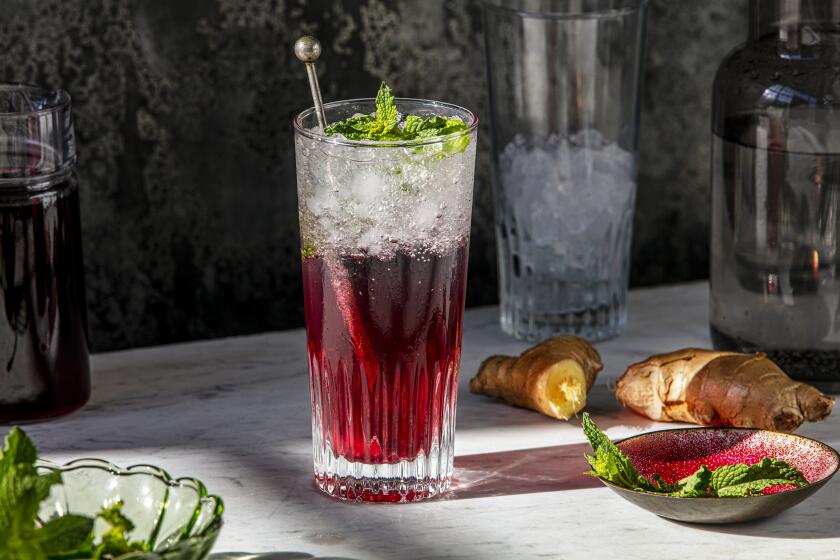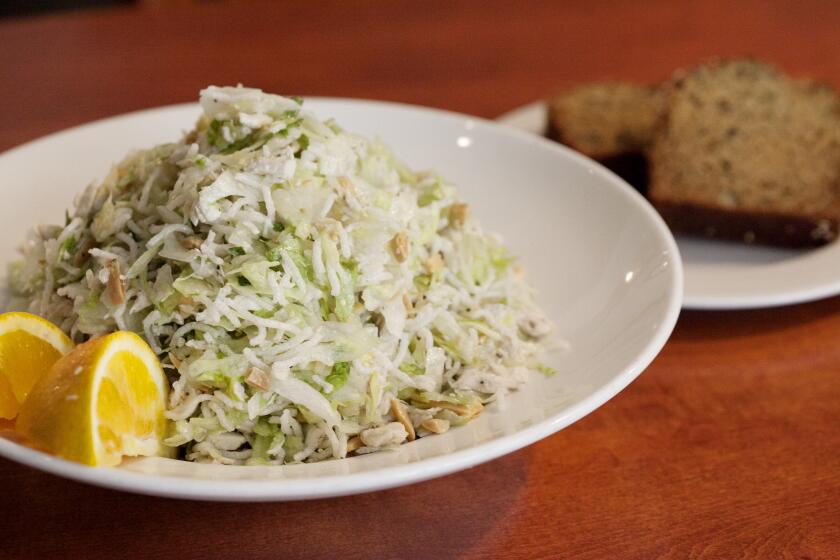How chef Ray Anthony Barrett is celebrating Juneteenth differently this year
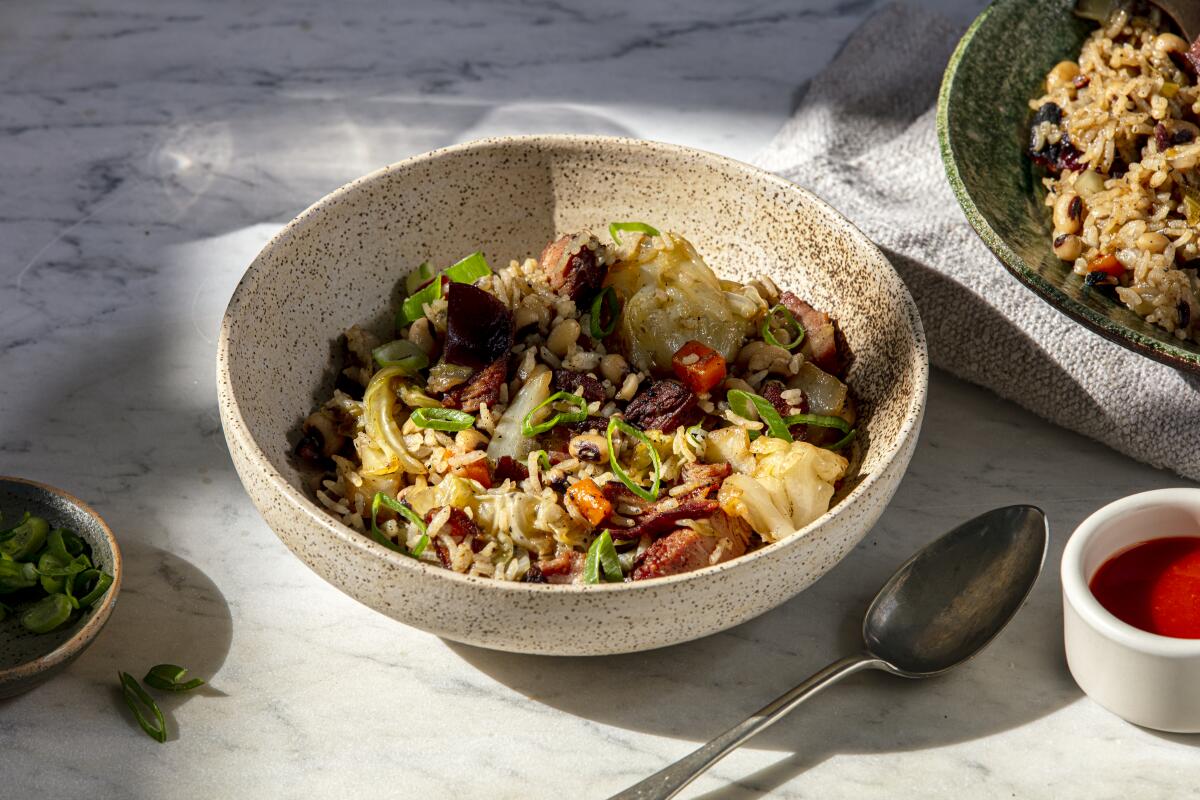
- Share via
Hoppin’ John, as holiday dishes go, is synonymous with New Year’s Day: Eating black-eyed peas richly seasoned and mingled with rice purports to bring good luck. But Ray Anthony Barrett’s extravagant rendering makes a persuasive case that Hoppin’ John also belongs on the Juneteenth celebration table.
He begins with pig’s feet, adapting the recipe for the jellied stock Fergus Henderson calls “trotter gear” by simmering them in white wine and a fistful of herbs. Domingo Rojo (a small, meaty variety of red bean) are first boiled and then baked with the pig’s feet jelly, fresh garlic, black garlic, tomato paste, black-eyed pea miso and bacon that Barrett smokes and cures himself. The beans practically oink by the end.
Then Barrett blends pureed collard greens into nutty Koda Farms brown rice. It dyes the grains the soft green color of a spring onion’s midsection. Lemon juice, parsley and homemade fermented hot sauce bring contrast and brightness. Together it’s a feat of layering you concentrate on, eyes closed, chasing every flavor until you surrender and let it all roll over your senses.
Some diners who’ve had Barrett’s Juneteenth dinners enjoy his vegan version with grilled shallot confit even more.
Hearing Barrett describe his approach to a Lowcountry staple with direct West African links sounds like he’s detailing an art project, which clicks: He’s a visual artist who had been shifting his professional aims toward cooking for the last several years.
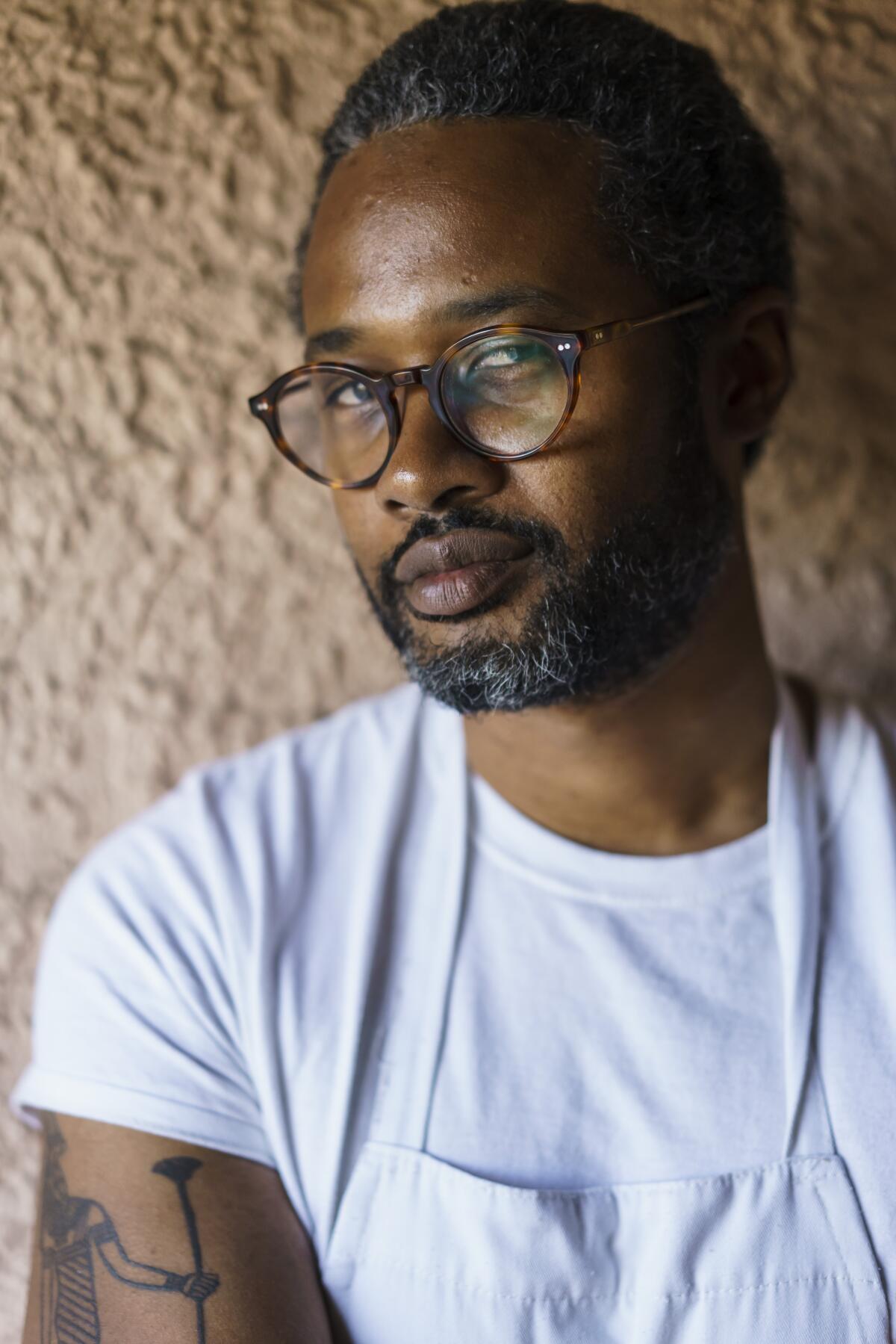
In 2018 he launched Cinqué, a popup and catering business with plans to open restaurants. His food considers the ties between West African cuisines and Black culinary innovation: confit duck leg with Dijon-accented caramelized onions (an homage to Poulet Yassa, a Senegalese staple); groundnut stew reengineered into a sauced, skewered short rib over rice; sweet potato crumble dolloped with torched meringue.
Barrett didn’t grow up eating Hoppin’ John. His mother first pulled out her version — magnificent in its own right, blasted with bacon and made with cabbage cooked to silk — when Barrett invited his high school girlfriend over for dinner. He took a bite and asked, “Where have you been hiding this?”
His reenvisioning became the marquee of his repertoire and the centerpiece of Juneteenth feasts that he made with Minh Phan of Porridge + Puffs in 2019 and 2020. The first year was a five-course, sit-down dinner flanked with elaborate starters and sides: a Phan collage of watermelon, okra, amaranth tempura and smoked fig; Barrett’s kale, chard and mustard greens with pistachios in an avocado-lime sauce.
Even in takeout bowls, last year’s edited-down spread of comforts lifted spirits. Braised greens with lobes of daikon came garnished with blushing Japanese ginger roots. Bronzed cornbread, cut in thick squares, was delicious smeared with butter and even better sopped in the greens’ pot liquor. A milky block of bread pudding completed the meal, crowned with near-candied loquats soaked in bourbon and maple syrup.
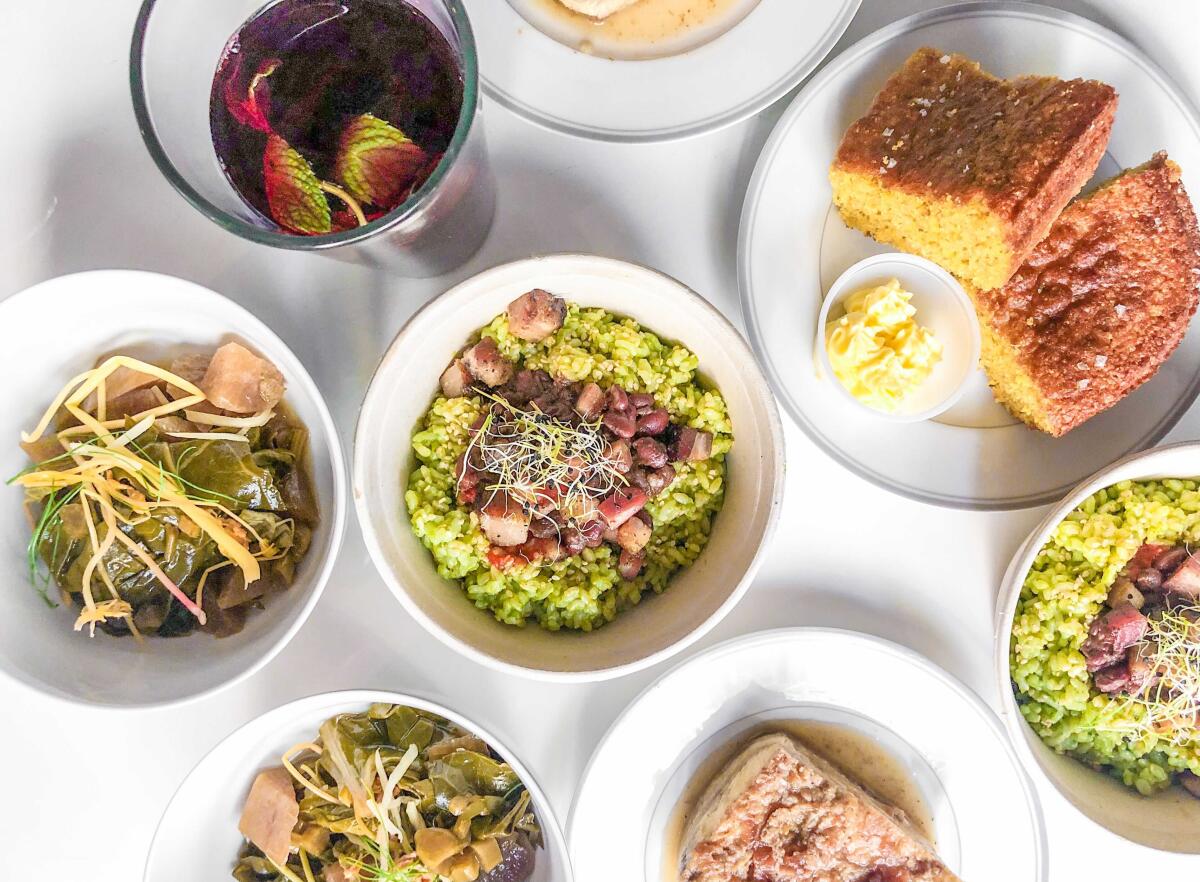
Juneteenth commemorates June 19, 1865, the date when enslaved African-Americans in Galveston, Texas, were belatedly informed of their freedom more than two years after the Emancipation Proclamation had been issued. Red foods and drinks are long-standing symbols in Black culture, especially at Juneteenth gatherings, that hearken back to West African traditions; they represent shed blood and perseverance.
At Juneteenth barbecues across the United States, modern-day celebrants might sip Big Red soda or strawberry-kiwi Kool-Aid. For his take, Barrett revisited bissap, a hibiscus beverage he’d tried when visiting Senegal, adding mint leaves, orange blossom water and ginger to echo the seasoning in the greens.
If Barrett’s collaborative Juneteenth dinners were poised to become an annual, joyfully anticipated happening, the seismic effects of the pandemic derailed those plans, for 2021 at least. This year Barrett is living his concepts of Juneteenth rather than cooking them.
::
If you happened to follow Barrett on Instagram this past winter, you noticed his stories feed detailed a stark shift in landscape: Barrett had relocated from Los Angeles to the California desert, near the Salton Sea, camping out of his converted catering van. He posted videos showing pans he’d hung from the truck bed. From the tailgate, he might be warming tortillas over canister stoves for pretty, avocado-laced fish tacos he made using canned sardines. One clip captured his just-made coffee steaming into a cold, clear morning.
The scenes suggested a certain rustic Insta-glamour — Barrett’s immaculate mealtime mise en place arrayed in plastic cups, selfies that showed him squint-smiling behind his tortoise-shell frames — but if you stopped to imagine yourself in the frame, you could feel the isolation bearing down like gravity.
Nearly a year earlier, at the start of March 2020, Barrett was confident enough that COVID-19 was a blip to quit his day job (he worked for the artistMark Grotjahn) and devote himself to Cinqué. Then the world stopped, as did the possibility of catering gigs. His then-business partner, Rashida Holmes of Bridgetown Roti, swung into takeout mode. Barrett couldn’t see himself stuffing the food he prepared into carryout bags day after day.
“By April, hopelessness and despair, caused by this country’s criminally negligent mishandling of the pandemic — compounded by my failing marriage — led to a relapse after six years of sobriety,” Barrett later wrote in a dispatch commissioned by Active Cultures, a Los Angeles nonprofit that explores the intersections of art and food. “I didn’t want to live anymore. After four days of drinking around the clock, I called my psychiatrist, increased my levels of antidepressants and made a decision to return to recovery.”
He committed to cooking the Juneteenth takeout feast with Phan. He rode his bike around the city and struggled to find a sense of purpose. In October 2020 he was invited to an artist residency at the Caldera Arts Center in Oregon’s Cascade Mountains. Cooking in solitude there over an open hearth, traveling to a wilderness far from Los Angeles, he had a persistent thought: “I wish I could just keep going.”
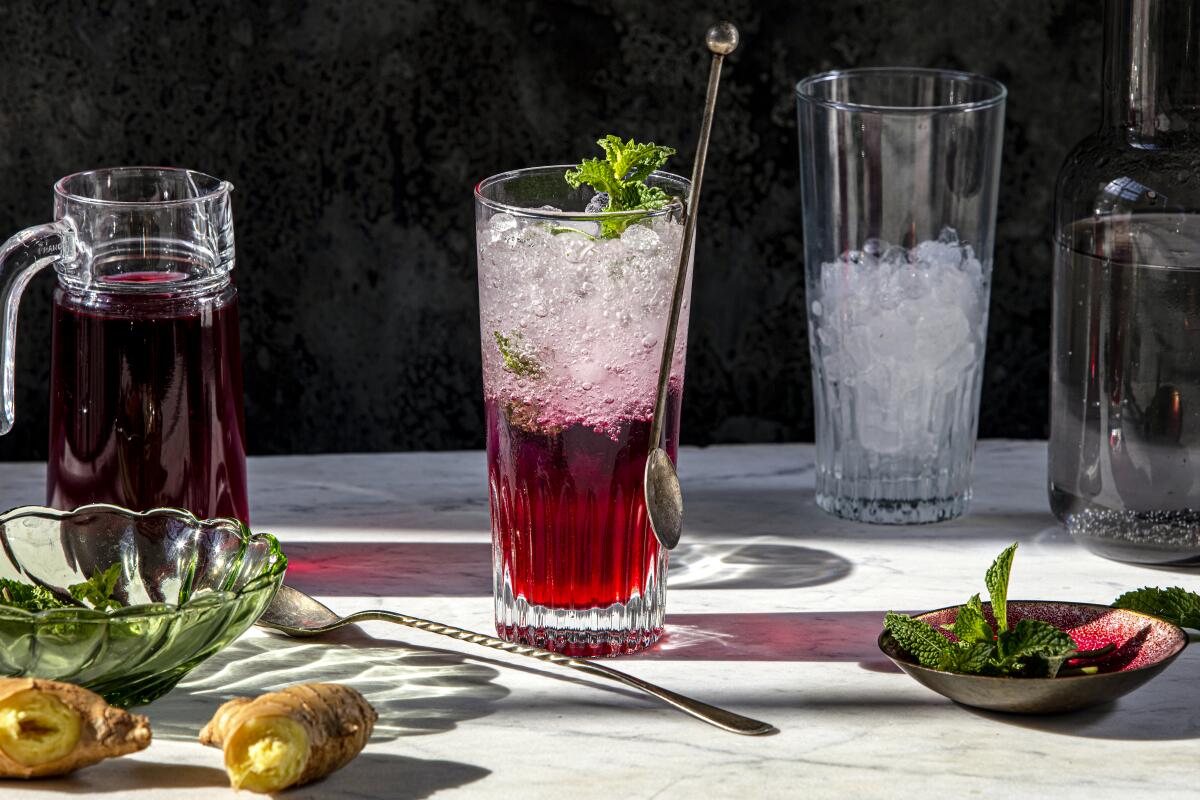
“This is the montage part of the movie,” he joked in a recent conversation, “where I go shopping to buy a tent and a sleeping bag and an ax.” A few weeks after he returned home from Oregon, he left L.A. on Thanksgiving to be mostly alone on the road for more than four months. In March, through friends, he was invited to stay in Marin County on True Grass Farms, where he was drawn in part to owner Guido Frosini’s commitment to regenerative land and water cycle practices. He’s been there since.
Wise enough to know his wanderings needed structure, Barrett created a project fusing his pursuits of art and food. He explains it this way: “It’s a Black man’s search for communion with the land — and a reflection on the land of this country that my ancestors cultivated, which they were driven off of and fled to cities. I’m cooking and preparing food as communion in the most literal sense, not as a metaphor for the body and the blood but … connecting with the soil, taking the time to sit with a chicken that I’m about to slaughter for a meal.”
Filmmaker Rusty Baldwin, a childhood friend of Barrett’s, documented parts of the journey in its most solitary early months.
The space has been healing for Barrett: “Learning how to set a fire, learning how to camp, learning how to pay attention to the weather — when the priority of needs was that severe and extreme, I found there was little time for anxiety and depression.”
Experiencing his own primacy of food and shelter has clarified the meaning of Juneteenth for him. His thoughts return often to the notion of what emancipation really means; they include autonomy and food security. “Owning one’s own land equates to the closest sense of freedom one could ever achieve in this country.”
He mentions the Black ministers who met with Union General William T. Sherman in Savannah, Ga., in 1865, who told him, “The way we can best take care of ourselves is to have land and turn it and till it by our own labor.” Sherman issued Special Field Order 15 four days later to redistribute 400,000 acres in 40-acre plots for Black families. President Andrew Johnson canceled the order by year’s end, breaking the promise of “40 acres and a mule.” Barrett wonders if the cultural scars etched by ensuing decades of systemic oppression and Jim Crow laws will ever fully heal.
His family didn’t celebrate Juneteenth when he was growing up in Kansas City, Mo.. “I always heard about it, like it would be mentioned on the Black radio station, and then I wouldn’t think about it,” he said. His awareness evolved as his studies of food and the African connections to it intensified. He noted the increased attention to the holiday, particularly by Americans who aren’t Black, after the 2020 social uprising spurred by the murder of George Floyd.
As the holiday approaches this year, Barrett plans to to return to Los Angeles. He has fears about coming back, he said, but feels more urgently the call to rejoin his community of culinary and artistic creators. “And I’ve got to work and make money to get land of my own,” he added.
Any chance of a last-minute Cinqué pop-up for Hoppin’ John on Juneteenth?
He laughed at the question.
“I feel the pressure, but I don’t feel that’s the right reason to do it. I don’t have the bandwidth. And you know, the year I’ve been through, what will come out of this, it has its own significance. I’ll be making a different kind of contribution this time around.”
Black-eyed peas, rice and cabbage — cooked with bacon and country ham — combine in chef Ray Anthony Barrett adaptation of his mom’s recipe.
Ray Anthony Barrett will join Donovan X. Ramsey, a Times staff writer covering Black life in Los Angeles, in a discussion of Black foodways and Juneteenth with Kevin Bludso of Bludso’s Bar & Que, John Cleveland of Post & Beam and Kim Prince of Hotville Chicken. The panel will take place via Zoom on June 15 at 6 p.m. Registration is available now.
More to Read
Eat your way across L.A.
Get our weekly Tasting Notes newsletter for reviews, news and more.
You may occasionally receive promotional content from the Los Angeles Times.

